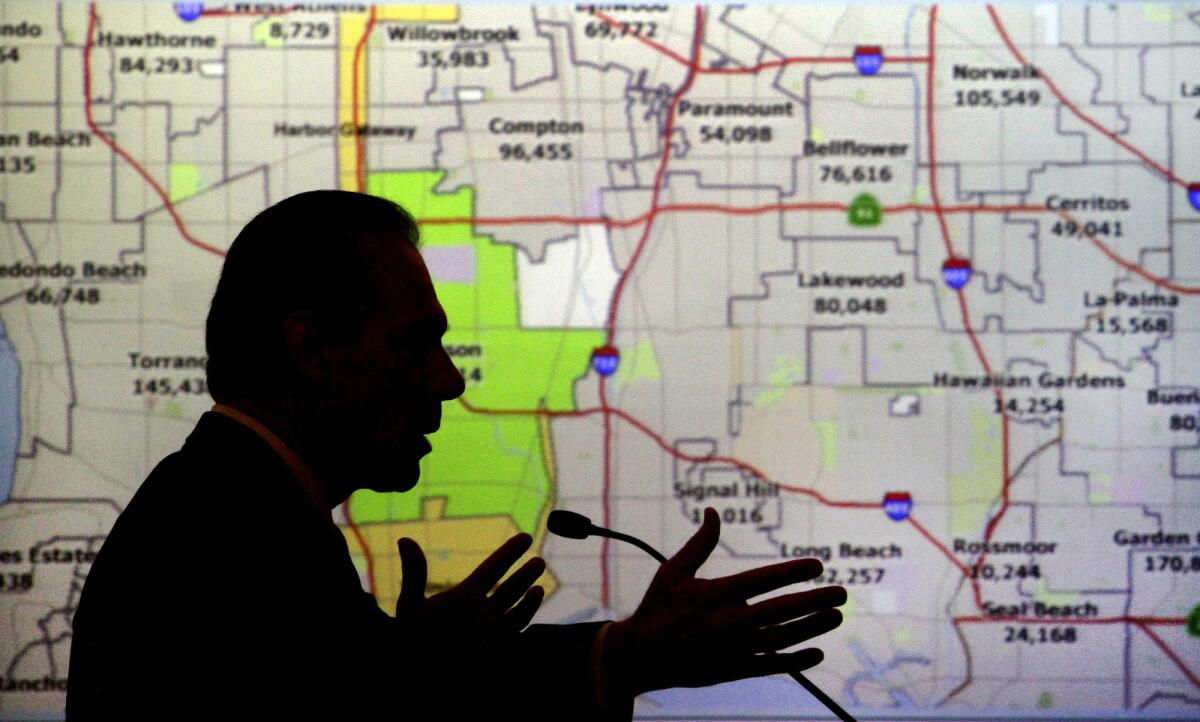L.A.’s last redistricting was a sham. City leaders have to do better this time

- Share via
Every 10 years, after the federal census but before the subsequent round of elections, cities and counties draw new electoral maps to reflect the updated population and demographic data. It’s an essential and important job that — when done well — can result in fairer elections and local elected bodies that are more representative of their constituents.
When it’s done poorly? Just look at the city of Los Angeles.
The last time the Los Angeles City Council’s district boundaries were redrawn, in 2012, the process was a sham. Sure, there was the appearance of impartiality and independence. A 21-member commission appointed by local elected officials held public meetings and listened to hours of public comments, all with the stated purpose of drawing council districts that would provide fair and effective representation for L.A.’s diverse communities.
But in reality, the lines drawn were the result of backroom deals cut by certain council members — in particular, then-Council President Herb Wesson — and carried out by their appointees on the commission, evidently to protect and reward their allies and hurt their enemies.
Among those rewarded was Councilman Jose Huizar, whose district was redrawn to include a development-rich swath of downtown Los Angeles. That gave him tremendous power over land-use decisions, along with lucrative new campaign fundraising opportunities. Federal prosecutors allege Huizar parlayed that new power into a criminal enterprise that raked in more than $1.5 million in cash and other benefits from companies looking to build.
Given the cloud of scandal that still hangs over City Hall, you’d think L.A.’s elected leaders would want to make this decade’s redistricting process as transparent and evenhanded as possible. But you would be wrong.
Council President Nury Martinez pushed through a couple of modest reforms — for example, the appointed commissioners will have to complete an ethics training course before they begin their work — but these fall far short of what’s needed. She has proposed requiring commissioners to disclose any private communications with elected officials or their staff — but that doesn’t cover conversations with friends or allies who reach out on behalf of a council member.
A coalition of community groups has offered a list of common-sense changes to ensure commissioners can do their work without undue political influence. The recommendations include a ban on all private communications with commissioners to prevent backroom deals, disclosure of conflicts of interest or relationships with council members, a formal removal process for commissioners so elected officials can’t yank their appointees at will, and an independent attorney and staff to support the commission.
Such changes could help build confidence in the redistricting process. That’s particularly important now, given that the commissioners appointed so far include many former elected officials and longtime political aides. (The deadline for appointments is Oct. 8.) If Los Angeles had a truly independent citizen redistricting commission, like the ones that serve San Diego, Long Beach and Sacramento, City Hall insiders and political operatives would likely be disqualified from serving on it.
Ultimately, that kind of independent commission is the only real solution. There’s no good reason to let elected officials — or their appointees — draw the lines and choose their voters. But converting L.A. to independent redistricting would require a ballot measure to change the city charter, so we’ll have to wait another decade for that reform.
In the meantime, Los Angeles leaders owe their constituents an honest, fair and transparent redistricting that puts the city’s needs above their own. That’s not too much to ask.
More to Read
A cure for the common opinion
Get thought-provoking perspectives with our weekly newsletter.
You may occasionally receive promotional content from the Los Angeles Times.









